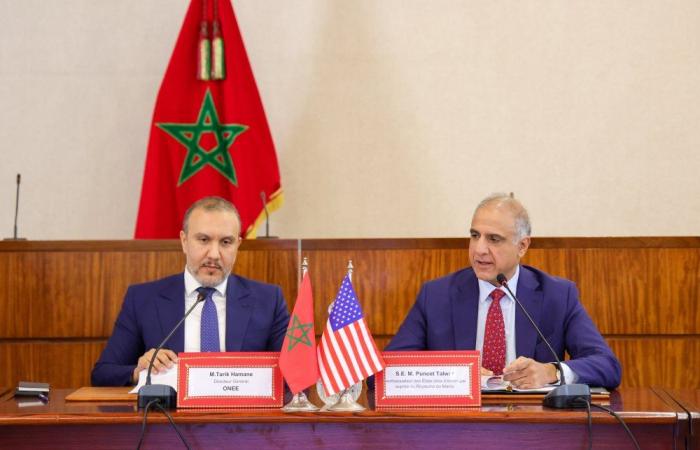Speaking at the opening of a technical workshop, organized in partnership with the United States Embassy in Rabat on advances in desalination (December 2-6), Mr. Hamane highlighted the central role of the Office in the realization of Morocco’s strategic objectives in terms of management of water resources and in energyin accordance with the High Guidelines of His Majesty King Mohammed VI. He noted that Morocco is increasingly adopting solutions based on unconventional water resources, notably the desalination of sea water, in response to the growing demand for water and the scarcity of natural resources due to the effects of climate change.
The current desalination program will increase the current desalination capacity, which is around 270 million m³ per year, produced through 16 desalination stations, to nearly 2,100 million m³ per year by 2030. including nearly 1,200 million m³ per year intended for drinking water, which will increase the share of drinking water supply provided by desalination of sea water at 55%, compared to only 10% currently, he explained.
For his part, the ambassador of UNITED STATES in Morocco, Puneet Talwar, indicated that the partnership between the two countries in the field of seawater desalination reflected their commitment to sustainable development and the fight against the challenges posed by climate change. “This workshop is an opportunity not only to share cutting-edge technologies, but also to support resilience and ensure a future with sufficient water resources,” he added.
US experts in sustainable water resources management, Rick Warner and Val Frenkel, delivered high-level presentations on innovative solutions for managing water resources in situations of scarcity. They also discussed the latest technological, economic and institutional advances in the field of water desalination. The two experts highlighted the major challenges facing seawater desalination projects globally, including the investment gap, financing for innovation, ongoing requirements for maintenance of infrastructure, as well as the time required for the installation and operation of new technologies.
Sharing the American experience in sustainable management of water resources, the two experts presented the main lessons learned from this experience, focused on improving performance and reducing production costs, while welcoming the Moroccan Water Plan. water, qualifying it as a rare model on a global scale that has been able to develop a national vision to respond to water stress. As for solutions, both experts suggested strengthening public-private partnerships, moving from crisis management to action, and developing infrastructure that contributes to water conservation and recycling.
Organized from December 2 to 6 at ONEE, this international exchange workshop constitutes a valuable opportunity to learn about American expertise in the sustainable management of water resources, with particular emphasis on strategic themes, such as the coupling of desalination with renewable energies, of which ONEE is a pioneer on a global scale, the reduction of production costs, the direct intake of raw water, its operation and maintenance.
The expert forum, which brings together around a hundred Moroccan and foreign participants specialized in the field of water, also aims to examine the technical aspects linked to the reduction of production costs, the direct intake of raw water, the operation and maintenance of this system. The event also explores innovative solutions, such as water remineralization. ONEE has more than 47 years of experience in the field of desalination and currently has 12 seawater desalination stations with a drinking water production capacity of more than 85 million m³ per year. This capacity will be increased by around 940 million m³ per year by 2030, including nearly 800 million m³ per year intended for drinking water, through 9 new desalination stations, 2 of which are currently under construction. (Casablanca and Sidi Ifni stations).






